ACCT20074: Corporate Crisis, Accounting Standards, and Politics
VerifiedAdded on 2023/01/11
|12
|3606
|83
Report
AI Summary
This report, prepared for ACCT20074, examines the significant impact of corporate crises on the evolution of accounting regulations and standards. It begins by analyzing the failures of Enron and Lehman Brothers, highlighting how these events spurred changes in financial reporting practices and the adoption of fair value measurement approaches to prevent misrepresentation of assets and liabilities. The report delves into the Sarbanes-Oxley Act, a direct response to the Enron scandal, and the modifications to fair value accounting post-2008 financial crisis. Furthermore, it critically evaluates the political processes involved in accounting standard setting, exploring the influence of lobbying and self-interests of preparers and governments on the International Accounting Standards Board (IASB) and the US Financial Accounting Standards Board (FASB), and their missions. The report uses examples from the US, Australia, and other global contexts to illustrate these points, providing a comprehensive overview of the interplay between corporate failures, regulatory responses, and the political landscape of accounting.
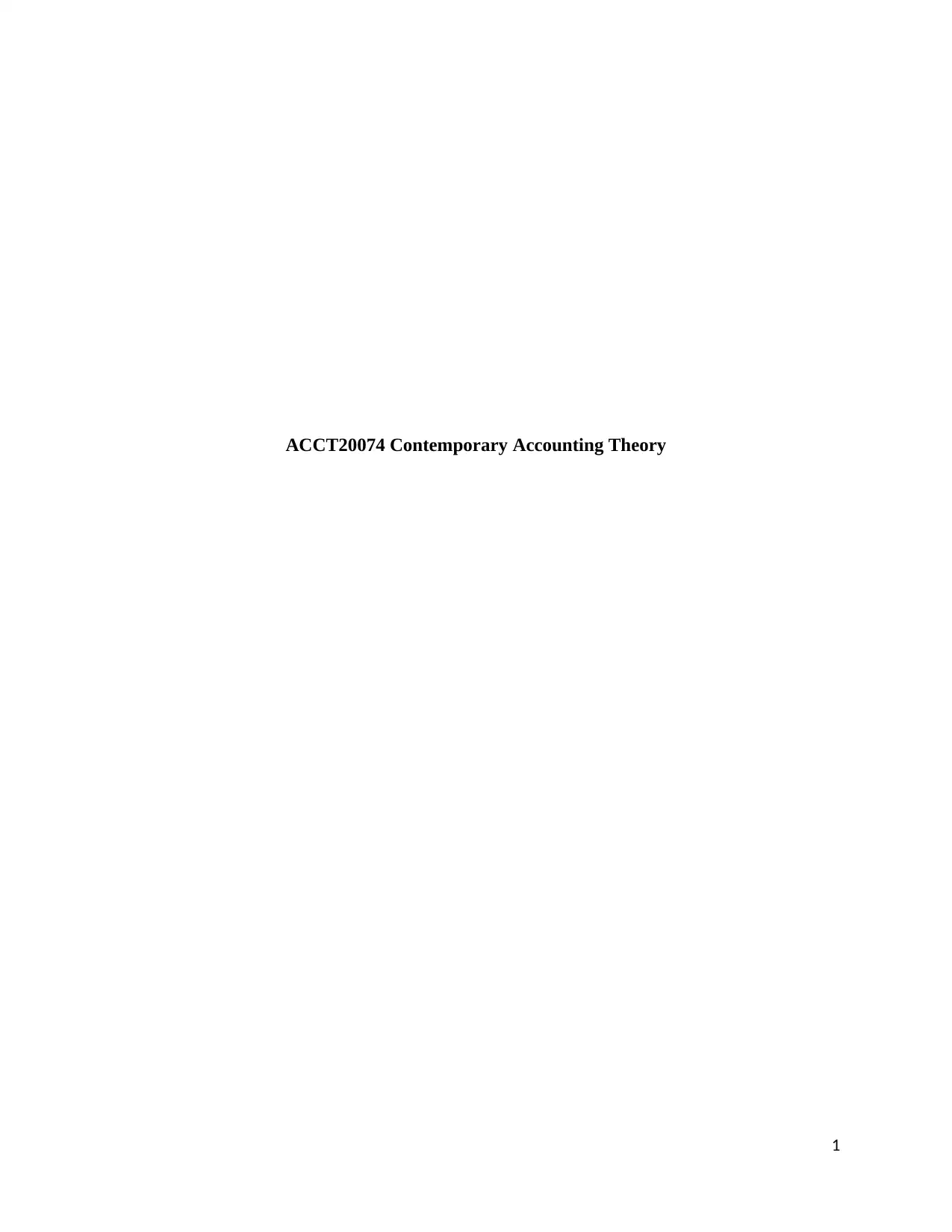
ACCT20074 Contemporary Accounting Theory
1
1
Paraphrase This Document
Need a fresh take? Get an instant paraphrase of this document with our AI Paraphraser
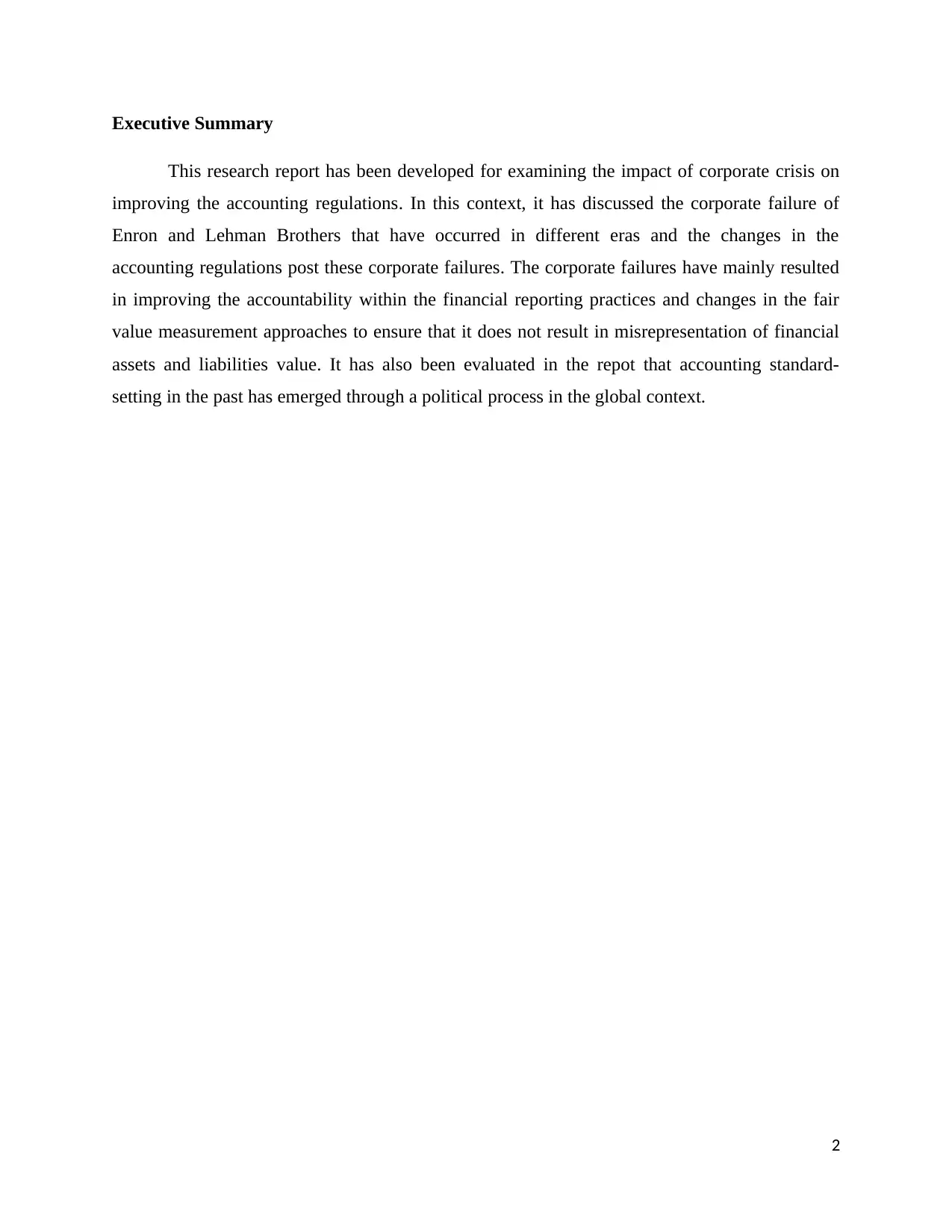
Executive Summary
This research report has been developed for examining the impact of corporate crisis on
improving the accounting regulations. In this context, it has discussed the corporate failure of
Enron and Lehman Brothers that have occurred in different eras and the changes in the
accounting regulations post these corporate failures. The corporate failures have mainly resulted
in improving the accountability within the financial reporting practices and changes in the fair
value measurement approaches to ensure that it does not result in misrepresentation of financial
assets and liabilities value. It has also been evaluated in the repot that accounting standard-
setting in the past has emerged through a political process in the global context.
2
This research report has been developed for examining the impact of corporate crisis on
improving the accounting regulations. In this context, it has discussed the corporate failure of
Enron and Lehman Brothers that have occurred in different eras and the changes in the
accounting regulations post these corporate failures. The corporate failures have mainly resulted
in improving the accountability within the financial reporting practices and changes in the fair
value measurement approaches to ensure that it does not result in misrepresentation of financial
assets and liabilities value. It has also been evaluated in the repot that accounting standard-
setting in the past has emerged through a political process in the global context.
2
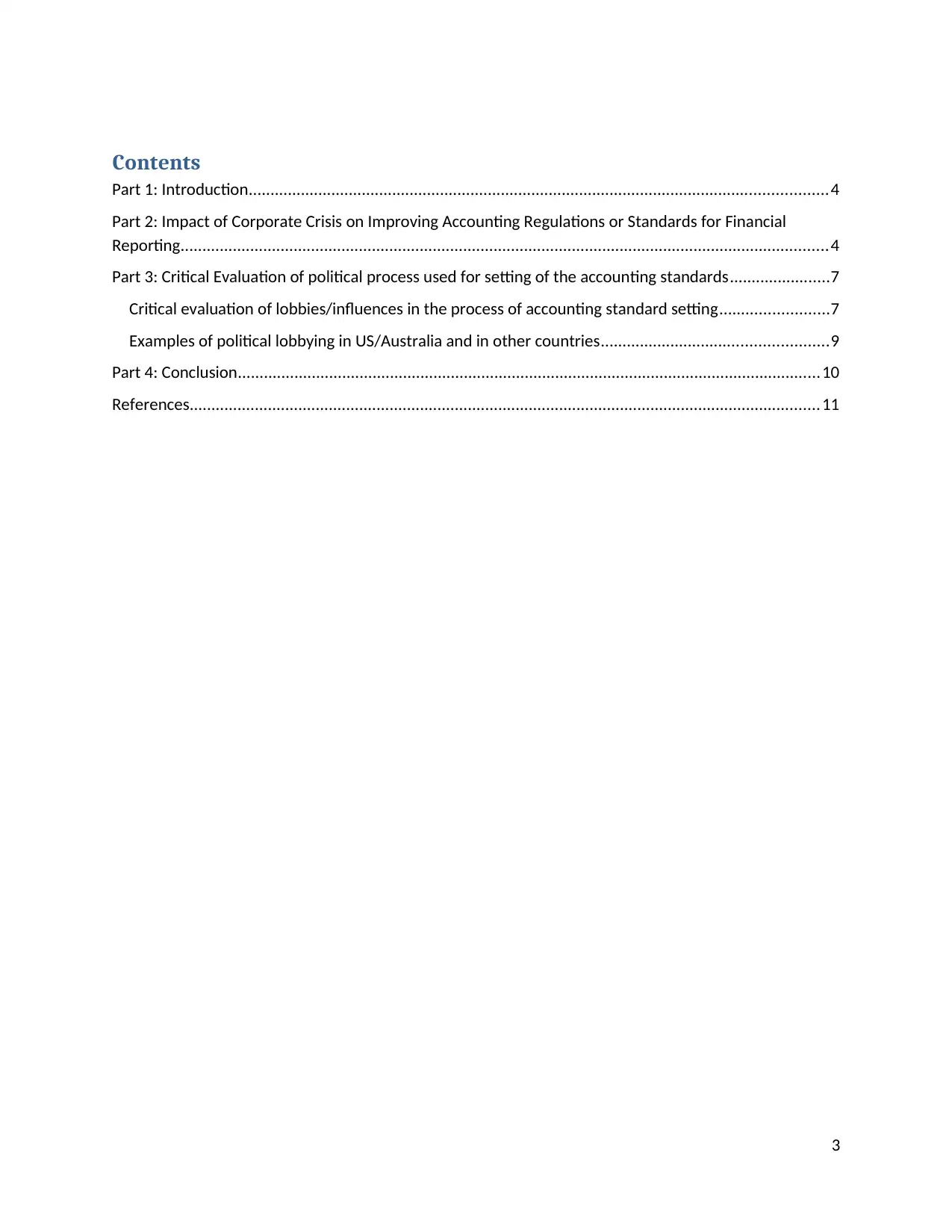
Contents
Part 1: Introduction.....................................................................................................................................4
Part 2: Impact of Corporate Crisis on Improving Accounting Regulations or Standards for Financial
Reporting.....................................................................................................................................................4
Part 3: Critical Evaluation of political process used for setting of the accounting standards.......................7
Critical evaluation of lobbies/influences in the process of accounting standard setting.........................7
Examples of political lobbying in US/Australia and in other countries....................................................9
Part 4: Conclusion......................................................................................................................................10
References.................................................................................................................................................11
3
Part 1: Introduction.....................................................................................................................................4
Part 2: Impact of Corporate Crisis on Improving Accounting Regulations or Standards for Financial
Reporting.....................................................................................................................................................4
Part 3: Critical Evaluation of political process used for setting of the accounting standards.......................7
Critical evaluation of lobbies/influences in the process of accounting standard setting.........................7
Examples of political lobbying in US/Australia and in other countries....................................................9
Part 4: Conclusion......................................................................................................................................10
References.................................................................................................................................................11
3
⊘ This is a preview!⊘
Do you want full access?
Subscribe today to unlock all pages.

Trusted by 1+ million students worldwide
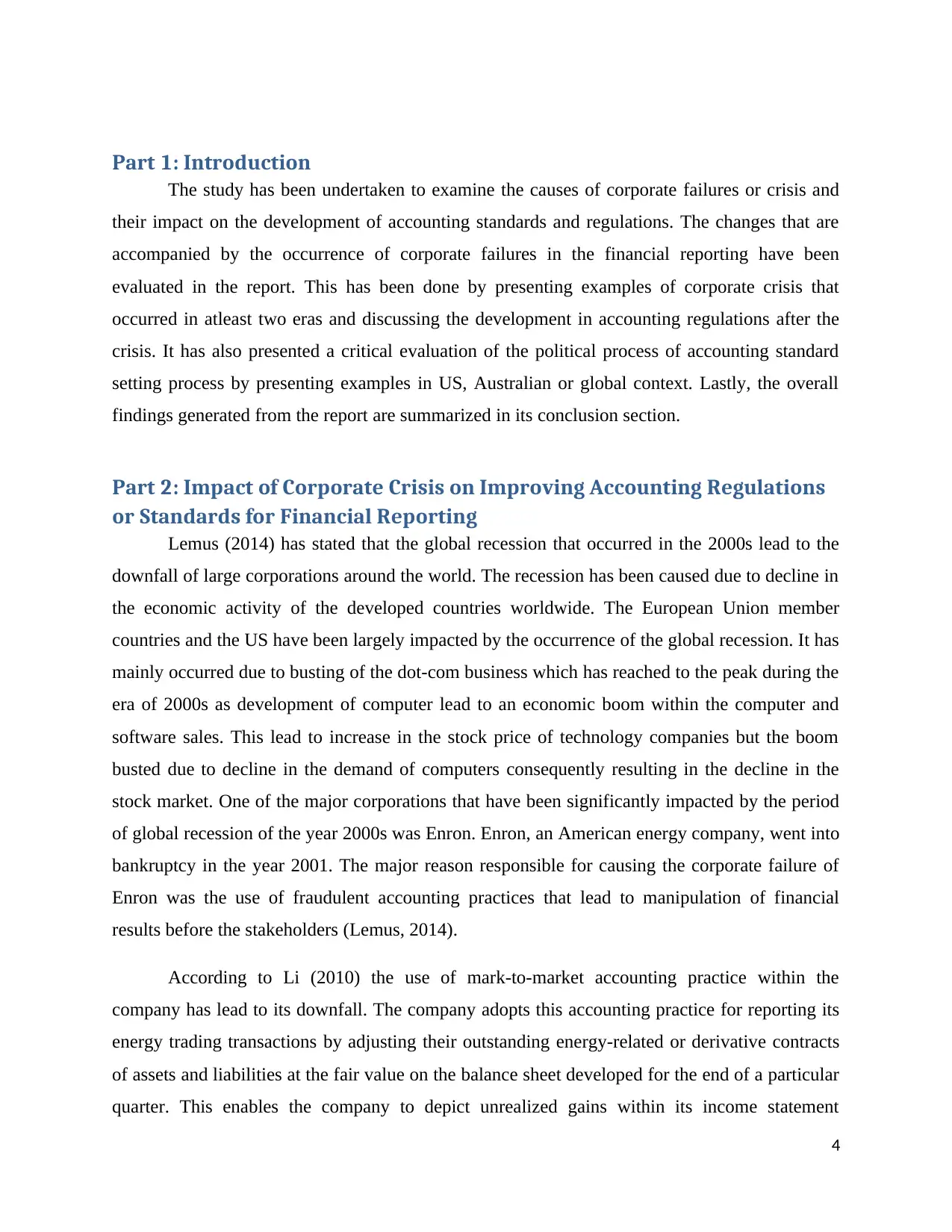
Part 1: Introduction
The study has been undertaken to examine the causes of corporate failures or crisis and
their impact on the development of accounting standards and regulations. The changes that are
accompanied by the occurrence of corporate failures in the financial reporting have been
evaluated in the report. This has been done by presenting examples of corporate crisis that
occurred in atleast two eras and discussing the development in accounting regulations after the
crisis. It has also presented a critical evaluation of the political process of accounting standard
setting process by presenting examples in US, Australian or global context. Lastly, the overall
findings generated from the report are summarized in its conclusion section.
Part 2: Impact of Corporate Crisis on Improving Accounting Regulations
or Standards for Financial Reporting
Lemus (2014) has stated that the global recession that occurred in the 2000s lead to the
downfall of large corporations around the world. The recession has been caused due to decline in
the economic activity of the developed countries worldwide. The European Union member
countries and the US have been largely impacted by the occurrence of the global recession. It has
mainly occurred due to busting of the dot-com business which has reached to the peak during the
era of 2000s as development of computer lead to an economic boom within the computer and
software sales. This lead to increase in the stock price of technology companies but the boom
busted due to decline in the demand of computers consequently resulting in the decline in the
stock market. One of the major corporations that have been significantly impacted by the period
of global recession of the year 2000s was Enron. Enron, an American energy company, went into
bankruptcy in the year 2001. The major reason responsible for causing the corporate failure of
Enron was the use of fraudulent accounting practices that lead to manipulation of financial
results before the stakeholders (Lemus, 2014).
According to Li (2010) the use of mark-to-market accounting practice within the
company has lead to its downfall. The company adopts this accounting practice for reporting its
energy trading transactions by adjusting their outstanding energy-related or derivative contracts
of assets and liabilities at the fair value on the balance sheet developed for the end of a particular
quarter. This enables the company to depict unrealized gains within its income statement
4
The study has been undertaken to examine the causes of corporate failures or crisis and
their impact on the development of accounting standards and regulations. The changes that are
accompanied by the occurrence of corporate failures in the financial reporting have been
evaluated in the report. This has been done by presenting examples of corporate crisis that
occurred in atleast two eras and discussing the development in accounting regulations after the
crisis. It has also presented a critical evaluation of the political process of accounting standard
setting process by presenting examples in US, Australian or global context. Lastly, the overall
findings generated from the report are summarized in its conclusion section.
Part 2: Impact of Corporate Crisis on Improving Accounting Regulations
or Standards for Financial Reporting
Lemus (2014) has stated that the global recession that occurred in the 2000s lead to the
downfall of large corporations around the world. The recession has been caused due to decline in
the economic activity of the developed countries worldwide. The European Union member
countries and the US have been largely impacted by the occurrence of the global recession. It has
mainly occurred due to busting of the dot-com business which has reached to the peak during the
era of 2000s as development of computer lead to an economic boom within the computer and
software sales. This lead to increase in the stock price of technology companies but the boom
busted due to decline in the demand of computers consequently resulting in the decline in the
stock market. One of the major corporations that have been significantly impacted by the period
of global recession of the year 2000s was Enron. Enron, an American energy company, went into
bankruptcy in the year 2001. The major reason responsible for causing the corporate failure of
Enron was the use of fraudulent accounting practices that lead to manipulation of financial
results before the stakeholders (Lemus, 2014).
According to Li (2010) the use of mark-to-market accounting practice within the
company has lead to its downfall. The company adopts this accounting practice for reporting its
energy trading transactions by adjusting their outstanding energy-related or derivative contracts
of assets and liabilities at the fair value on the balance sheet developed for the end of a particular
quarter. This enables the company to depict unrealized gains within its income statement
4
Paraphrase This Document
Need a fresh take? Get an instant paraphrase of this document with our AI Paraphraser
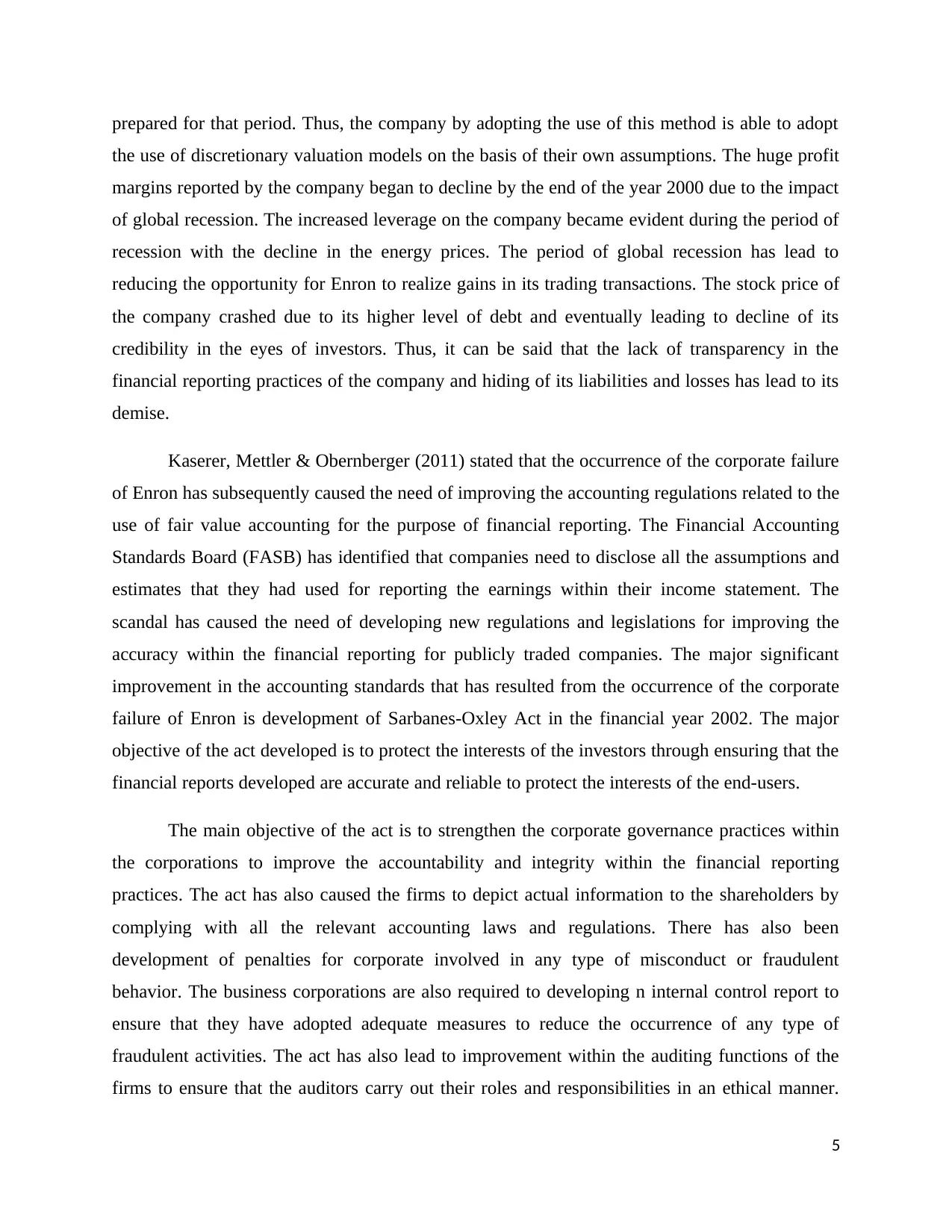
prepared for that period. Thus, the company by adopting the use of this method is able to adopt
the use of discretionary valuation models on the basis of their own assumptions. The huge profit
margins reported by the company began to decline by the end of the year 2000 due to the impact
of global recession. The increased leverage on the company became evident during the period of
recession with the decline in the energy prices. The period of global recession has lead to
reducing the opportunity for Enron to realize gains in its trading transactions. The stock price of
the company crashed due to its higher level of debt and eventually leading to decline of its
credibility in the eyes of investors. Thus, it can be said that the lack of transparency in the
financial reporting practices of the company and hiding of its liabilities and losses has lead to its
demise.
Kaserer, Mettler & Obernberger (2011) stated that the occurrence of the corporate failure
of Enron has subsequently caused the need of improving the accounting regulations related to the
use of fair value accounting for the purpose of financial reporting. The Financial Accounting
Standards Board (FASB) has identified that companies need to disclose all the assumptions and
estimates that they had used for reporting the earnings within their income statement. The
scandal has caused the need of developing new regulations and legislations for improving the
accuracy within the financial reporting for publicly traded companies. The major significant
improvement in the accounting standards that has resulted from the occurrence of the corporate
failure of Enron is development of Sarbanes-Oxley Act in the financial year 2002. The major
objective of the act developed is to protect the interests of the investors through ensuring that the
financial reports developed are accurate and reliable to protect the interests of the end-users.
The main objective of the act is to strengthen the corporate governance practices within
the corporations to improve the accountability and integrity within the financial reporting
practices. The act has also caused the firms to depict actual information to the shareholders by
complying with all the relevant accounting laws and regulations. There has also been
development of penalties for corporate involved in any type of misconduct or fraudulent
behavior. The business corporations are also required to developing n internal control report to
ensure that they have adopted adequate measures to reduce the occurrence of any type of
fraudulent activities. The act has also lead to improvement within the auditing functions of the
firms to ensure that the auditors carry out their roles and responsibilities in an ethical manner.
5
the use of discretionary valuation models on the basis of their own assumptions. The huge profit
margins reported by the company began to decline by the end of the year 2000 due to the impact
of global recession. The increased leverage on the company became evident during the period of
recession with the decline in the energy prices. The period of global recession has lead to
reducing the opportunity for Enron to realize gains in its trading transactions. The stock price of
the company crashed due to its higher level of debt and eventually leading to decline of its
credibility in the eyes of investors. Thus, it can be said that the lack of transparency in the
financial reporting practices of the company and hiding of its liabilities and losses has lead to its
demise.
Kaserer, Mettler & Obernberger (2011) stated that the occurrence of the corporate failure
of Enron has subsequently caused the need of improving the accounting regulations related to the
use of fair value accounting for the purpose of financial reporting. The Financial Accounting
Standards Board (FASB) has identified that companies need to disclose all the assumptions and
estimates that they had used for reporting the earnings within their income statement. The
scandal has caused the need of developing new regulations and legislations for improving the
accuracy within the financial reporting for publicly traded companies. The major significant
improvement in the accounting standards that has resulted from the occurrence of the corporate
failure of Enron is development of Sarbanes-Oxley Act in the financial year 2002. The major
objective of the act developed is to protect the interests of the investors through ensuring that the
financial reports developed are accurate and reliable to protect the interests of the end-users.
The main objective of the act is to strengthen the corporate governance practices within
the corporations to improve the accountability and integrity within the financial reporting
practices. The act has also caused the firms to depict actual information to the shareholders by
complying with all the relevant accounting laws and regulations. There has also been
development of penalties for corporate involved in any type of misconduct or fraudulent
behavior. The business corporations are also required to developing n internal control report to
ensure that they have adopted adequate measures to reduce the occurrence of any type of
fraudulent activities. The act has also lead to improvement within the auditing functions of the
firms to ensure that the auditors carry out their roles and responsibilities in an ethical manner.
5
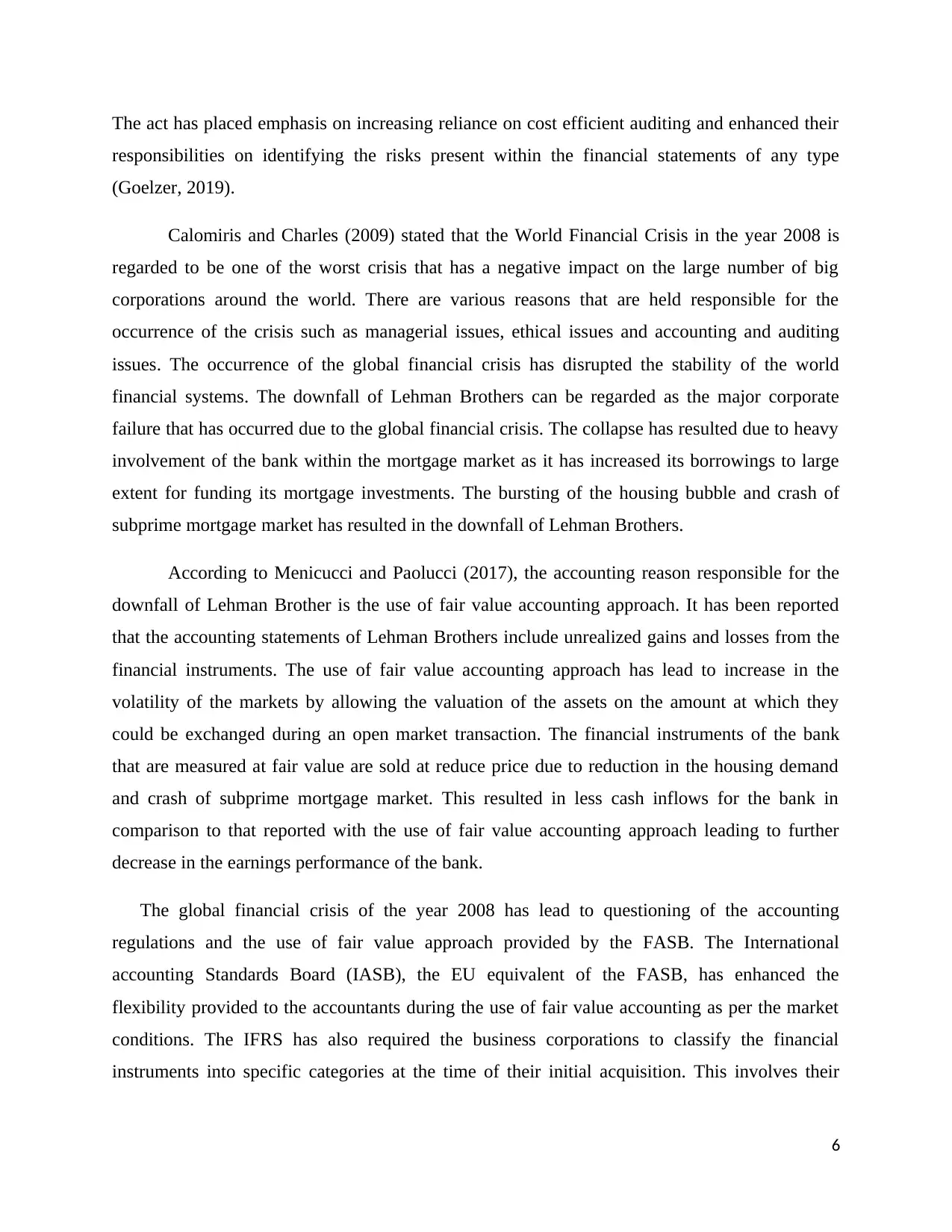
The act has placed emphasis on increasing reliance on cost efficient auditing and enhanced their
responsibilities on identifying the risks present within the financial statements of any type
(Goelzer, 2019).
Calomiris and Charles (2009) stated that the World Financial Crisis in the year 2008 is
regarded to be one of the worst crisis that has a negative impact on the large number of big
corporations around the world. There are various reasons that are held responsible for the
occurrence of the crisis such as managerial issues, ethical issues and accounting and auditing
issues. The occurrence of the global financial crisis has disrupted the stability of the world
financial systems. The downfall of Lehman Brothers can be regarded as the major corporate
failure that has occurred due to the global financial crisis. The collapse has resulted due to heavy
involvement of the bank within the mortgage market as it has increased its borrowings to large
extent for funding its mortgage investments. The bursting of the housing bubble and crash of
subprime mortgage market has resulted in the downfall of Lehman Brothers.
According to Menicucci and Paolucci (2017), the accounting reason responsible for the
downfall of Lehman Brother is the use of fair value accounting approach. It has been reported
that the accounting statements of Lehman Brothers include unrealized gains and losses from the
financial instruments. The use of fair value accounting approach has lead to increase in the
volatility of the markets by allowing the valuation of the assets on the amount at which they
could be exchanged during an open market transaction. The financial instruments of the bank
that are measured at fair value are sold at reduce price due to reduction in the housing demand
and crash of subprime mortgage market. This resulted in less cash inflows for the bank in
comparison to that reported with the use of fair value accounting approach leading to further
decrease in the earnings performance of the bank.
The global financial crisis of the year 2008 has lead to questioning of the accounting
regulations and the use of fair value approach provided by the FASB. The International
accounting Standards Board (IASB), the EU equivalent of the FASB, has enhanced the
flexibility provided to the accountants during the use of fair value accounting as per the market
conditions. The IFRS has also required the business corporations to classify the financial
instruments into specific categories at the time of their initial acquisition. This involves their
6
responsibilities on identifying the risks present within the financial statements of any type
(Goelzer, 2019).
Calomiris and Charles (2009) stated that the World Financial Crisis in the year 2008 is
regarded to be one of the worst crisis that has a negative impact on the large number of big
corporations around the world. There are various reasons that are held responsible for the
occurrence of the crisis such as managerial issues, ethical issues and accounting and auditing
issues. The occurrence of the global financial crisis has disrupted the stability of the world
financial systems. The downfall of Lehman Brothers can be regarded as the major corporate
failure that has occurred due to the global financial crisis. The collapse has resulted due to heavy
involvement of the bank within the mortgage market as it has increased its borrowings to large
extent for funding its mortgage investments. The bursting of the housing bubble and crash of
subprime mortgage market has resulted in the downfall of Lehman Brothers.
According to Menicucci and Paolucci (2017), the accounting reason responsible for the
downfall of Lehman Brother is the use of fair value accounting approach. It has been reported
that the accounting statements of Lehman Brothers include unrealized gains and losses from the
financial instruments. The use of fair value accounting approach has lead to increase in the
volatility of the markets by allowing the valuation of the assets on the amount at which they
could be exchanged during an open market transaction. The financial instruments of the bank
that are measured at fair value are sold at reduce price due to reduction in the housing demand
and crash of subprime mortgage market. This resulted in less cash inflows for the bank in
comparison to that reported with the use of fair value accounting approach leading to further
decrease in the earnings performance of the bank.
The global financial crisis of the year 2008 has lead to questioning of the accounting
regulations and the use of fair value approach provided by the FASB. The International
accounting Standards Board (IASB), the EU equivalent of the FASB, has enhanced the
flexibility provided to the accountants during the use of fair value accounting as per the market
conditions. The IFRS has also required the business corporations to classify the financial
instruments into specific categories at the time of their initial acquisition. This involves their
6
⊘ This is a preview!⊘
Do you want full access?
Subscribe today to unlock all pages.

Trusted by 1+ million students worldwide
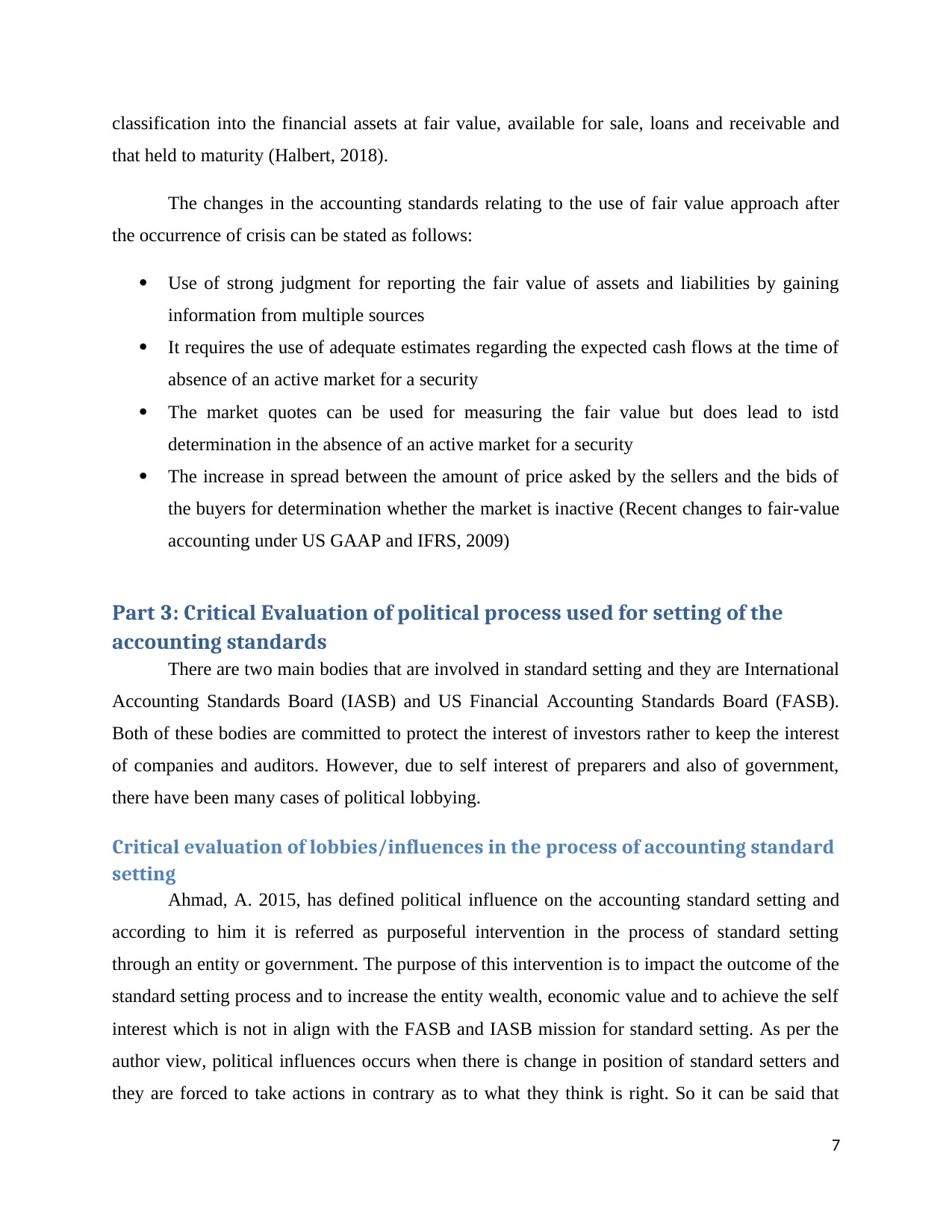
classification into the financial assets at fair value, available for sale, loans and receivable and
that held to maturity (Halbert, 2018).
The changes in the accounting standards relating to the use of fair value approach after
the occurrence of crisis can be stated as follows:
Use of strong judgment for reporting the fair value of assets and liabilities by gaining
information from multiple sources
It requires the use of adequate estimates regarding the expected cash flows at the time of
absence of an active market for a security
The market quotes can be used for measuring the fair value but does lead to istd
determination in the absence of an active market for a security
The increase in spread between the amount of price asked by the sellers and the bids of
the buyers for determination whether the market is inactive (Recent changes to fair-value
accounting under US GAAP and IFRS, 2009)
Part 3: Critical Evaluation of political process used for setting of the
accounting standards
There are two main bodies that are involved in standard setting and they are International
Accounting Standards Board (IASB) and US Financial Accounting Standards Board (FASB).
Both of these bodies are committed to protect the interest of investors rather to keep the interest
of companies and auditors. However, due to self interest of preparers and also of government,
there have been many cases of political lobbying.
Critical evaluation of lobbies/influences in the process of accounting standard
setting
Ahmad, A. 2015, has defined political influence on the accounting standard setting and
according to him it is referred as purposeful intervention in the process of standard setting
through an entity or government. The purpose of this intervention is to impact the outcome of the
standard setting process and to increase the entity wealth, economic value and to achieve the self
interest which is not in align with the FASB and IASB mission for standard setting. As per the
author view, political influences occurs when there is change in position of standard setters and
they are forced to take actions in contrary as to what they think is right. So it can be said that
7
that held to maturity (Halbert, 2018).
The changes in the accounting standards relating to the use of fair value approach after
the occurrence of crisis can be stated as follows:
Use of strong judgment for reporting the fair value of assets and liabilities by gaining
information from multiple sources
It requires the use of adequate estimates regarding the expected cash flows at the time of
absence of an active market for a security
The market quotes can be used for measuring the fair value but does lead to istd
determination in the absence of an active market for a security
The increase in spread between the amount of price asked by the sellers and the bids of
the buyers for determination whether the market is inactive (Recent changes to fair-value
accounting under US GAAP and IFRS, 2009)
Part 3: Critical Evaluation of political process used for setting of the
accounting standards
There are two main bodies that are involved in standard setting and they are International
Accounting Standards Board (IASB) and US Financial Accounting Standards Board (FASB).
Both of these bodies are committed to protect the interest of investors rather to keep the interest
of companies and auditors. However, due to self interest of preparers and also of government,
there have been many cases of political lobbying.
Critical evaluation of lobbies/influences in the process of accounting standard
setting
Ahmad, A. 2015, has defined political influence on the accounting standard setting and
according to him it is referred as purposeful intervention in the process of standard setting
through an entity or government. The purpose of this intervention is to impact the outcome of the
standard setting process and to increase the entity wealth, economic value and to achieve the self
interest which is not in align with the FASB and IASB mission for standard setting. As per the
author view, political influences occurs when there is change in position of standard setters and
they are forced to take actions in contrary as to what they think is right. So it can be said that
7
Paraphrase This Document
Need a fresh take? Get an instant paraphrase of this document with our AI Paraphraser
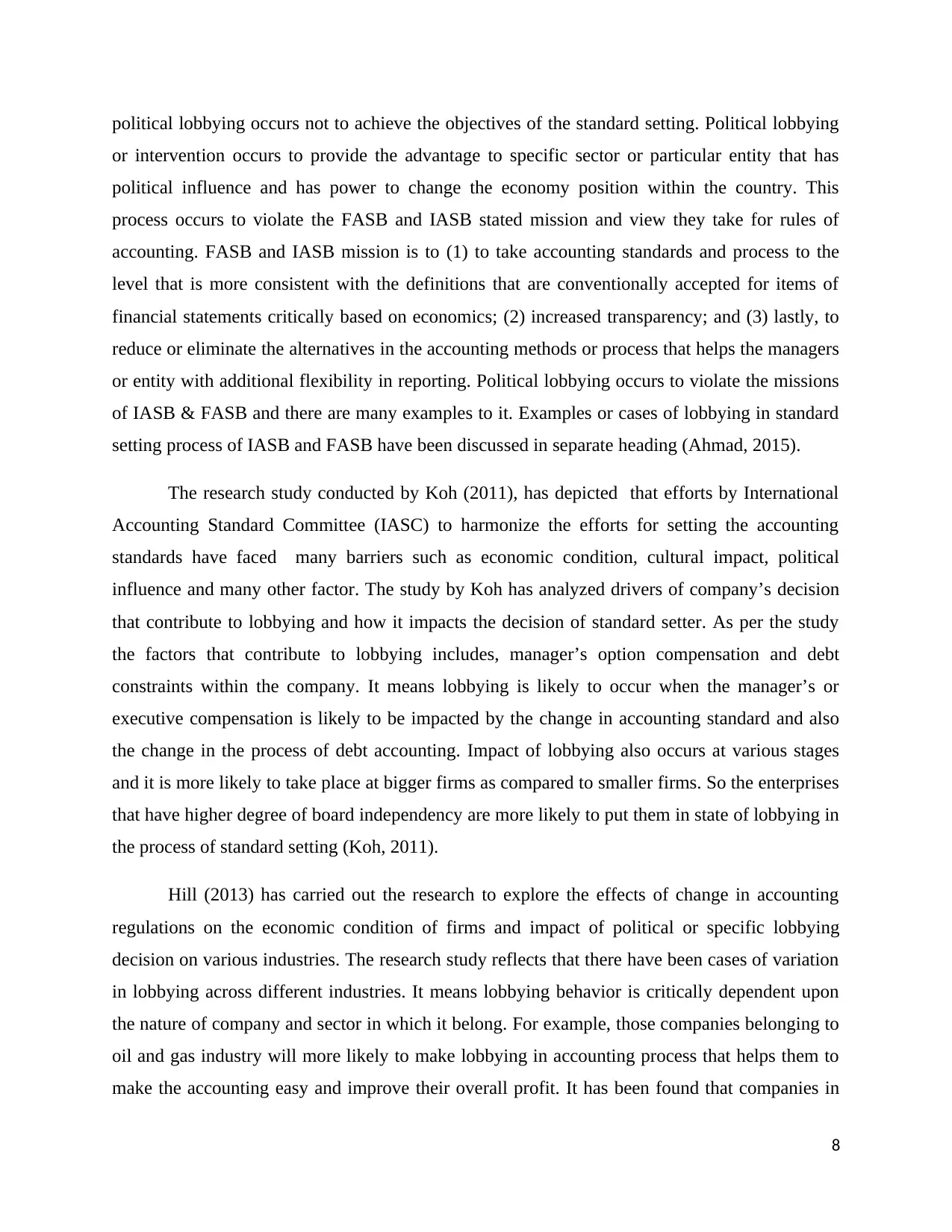
political lobbying occurs not to achieve the objectives of the standard setting. Political lobbying
or intervention occurs to provide the advantage to specific sector or particular entity that has
political influence and has power to change the economy position within the country. This
process occurs to violate the FASB and IASB stated mission and view they take for rules of
accounting. FASB and IASB mission is to (1) to take accounting standards and process to the
level that is more consistent with the definitions that are conventionally accepted for items of
financial statements critically based on economics; (2) increased transparency; and (3) lastly, to
reduce or eliminate the alternatives in the accounting methods or process that helps the managers
or entity with additional flexibility in reporting. Political lobbying occurs to violate the missions
of IASB & FASB and there are many examples to it. Examples or cases of lobbying in standard
setting process of IASB and FASB have been discussed in separate heading (Ahmad, 2015).
The research study conducted by Koh (2011), has depicted that efforts by International
Accounting Standard Committee (IASC) to harmonize the efforts for setting the accounting
standards have faced many barriers such as economic condition, cultural impact, political
influence and many other factor. The study by Koh has analyzed drivers of company’s decision
that contribute to lobbying and how it impacts the decision of standard setter. As per the study
the factors that contribute to lobbying includes, manager’s option compensation and debt
constraints within the company. It means lobbying is likely to occur when the manager’s or
executive compensation is likely to be impacted by the change in accounting standard and also
the change in the process of debt accounting. Impact of lobbying also occurs at various stages
and it is more likely to take place at bigger firms as compared to smaller firms. So the enterprises
that have higher degree of board independency are more likely to put them in state of lobbying in
the process of standard setting (Koh, 2011).
Hill (2013) has carried out the research to explore the effects of change in accounting
regulations on the economic condition of firms and impact of political or specific lobbying
decision on various industries. The research study reflects that there have been cases of variation
in lobbying across different industries. It means lobbying behavior is critically dependent upon
the nature of company and sector in which it belong. For example, those companies belonging to
oil and gas industry will more likely to make lobbying in accounting process that helps them to
make the accounting easy and improve their overall profit. It has been found that companies in
8
or intervention occurs to provide the advantage to specific sector or particular entity that has
political influence and has power to change the economy position within the country. This
process occurs to violate the FASB and IASB stated mission and view they take for rules of
accounting. FASB and IASB mission is to (1) to take accounting standards and process to the
level that is more consistent with the definitions that are conventionally accepted for items of
financial statements critically based on economics; (2) increased transparency; and (3) lastly, to
reduce or eliminate the alternatives in the accounting methods or process that helps the managers
or entity with additional flexibility in reporting. Political lobbying occurs to violate the missions
of IASB & FASB and there are many examples to it. Examples or cases of lobbying in standard
setting process of IASB and FASB have been discussed in separate heading (Ahmad, 2015).
The research study conducted by Koh (2011), has depicted that efforts by International
Accounting Standard Committee (IASC) to harmonize the efforts for setting the accounting
standards have faced many barriers such as economic condition, cultural impact, political
influence and many other factor. The study by Koh has analyzed drivers of company’s decision
that contribute to lobbying and how it impacts the decision of standard setter. As per the study
the factors that contribute to lobbying includes, manager’s option compensation and debt
constraints within the company. It means lobbying is likely to occur when the manager’s or
executive compensation is likely to be impacted by the change in accounting standard and also
the change in the process of debt accounting. Impact of lobbying also occurs at various stages
and it is more likely to take place at bigger firms as compared to smaller firms. So the enterprises
that have higher degree of board independency are more likely to put them in state of lobbying in
the process of standard setting (Koh, 2011).
Hill (2013) has carried out the research to explore the effects of change in accounting
regulations on the economic condition of firms and impact of political or specific lobbying
decision on various industries. The research study reflects that there have been cases of variation
in lobbying across different industries. It means lobbying behavior is critically dependent upon
the nature of company and sector in which it belong. For example, those companies belonging to
oil and gas industry will more likely to make lobbying in accounting process that helps them to
make the accounting easy and improve their overall profit. It has been found that companies in
8
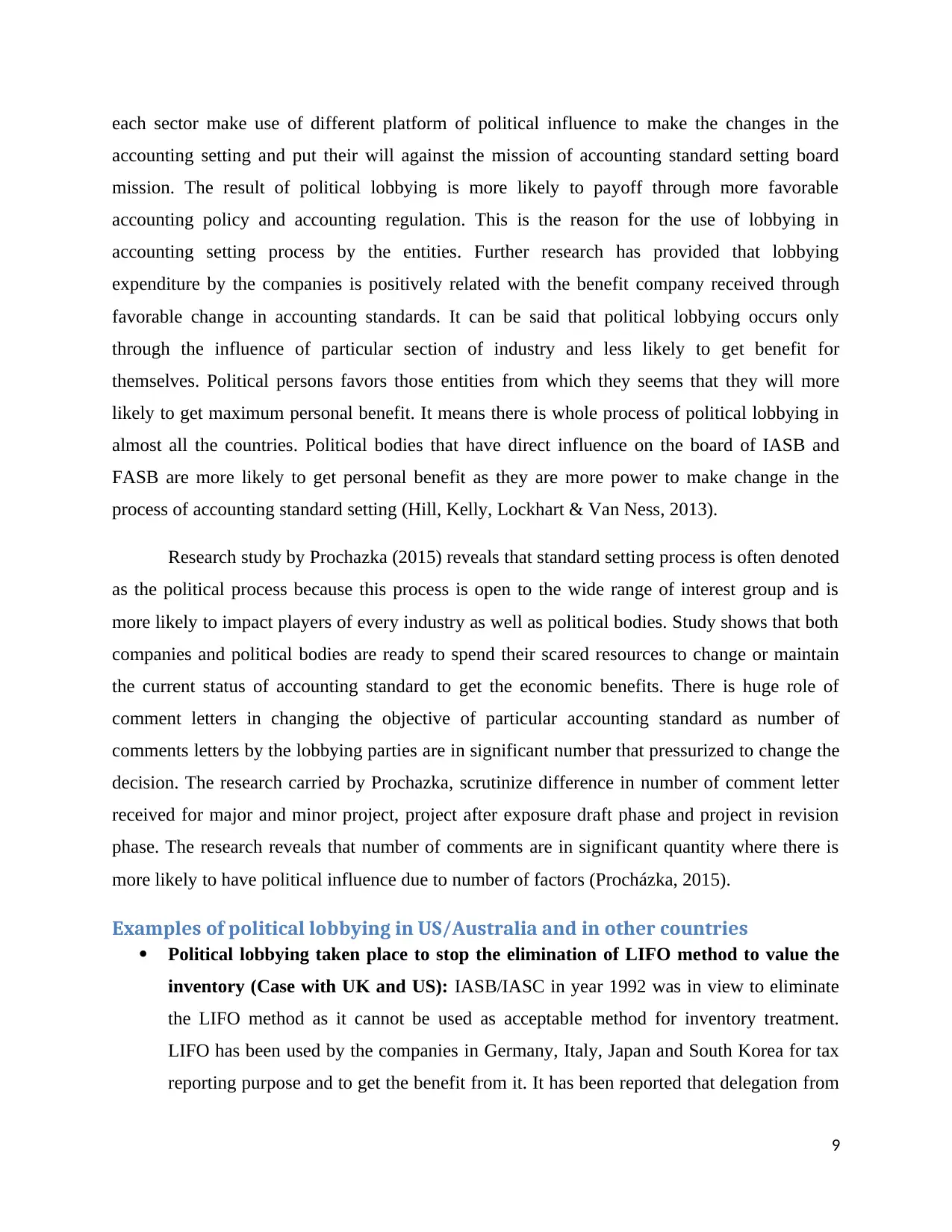
each sector make use of different platform of political influence to make the changes in the
accounting setting and put their will against the mission of accounting standard setting board
mission. The result of political lobbying is more likely to payoff through more favorable
accounting policy and accounting regulation. This is the reason for the use of lobbying in
accounting setting process by the entities. Further research has provided that lobbying
expenditure by the companies is positively related with the benefit company received through
favorable change in accounting standards. It can be said that political lobbying occurs only
through the influence of particular section of industry and less likely to get benefit for
themselves. Political persons favors those entities from which they seems that they will more
likely to get maximum personal benefit. It means there is whole process of political lobbying in
almost all the countries. Political bodies that have direct influence on the board of IASB and
FASB are more likely to get personal benefit as they are more power to make change in the
process of accounting standard setting (Hill, Kelly, Lockhart & Van Ness, 2013).
Research study by Prochazka (2015) reveals that standard setting process is often denoted
as the political process because this process is open to the wide range of interest group and is
more likely to impact players of every industry as well as political bodies. Study shows that both
companies and political bodies are ready to spend their scared resources to change or maintain
the current status of accounting standard to get the economic benefits. There is huge role of
comment letters in changing the objective of particular accounting standard as number of
comments letters by the lobbying parties are in significant number that pressurized to change the
decision. The research carried by Prochazka, scrutinize difference in number of comment letter
received for major and minor project, project after exposure draft phase and project in revision
phase. The research reveals that number of comments are in significant quantity where there is
more likely to have political influence due to number of factors (Procházka, 2015).
Examples of political lobbying in US/Australia and in other countries
Political lobbying taken place to stop the elimination of LIFO method to value the
inventory (Case with UK and US): IASB/IASC in year 1992 was in view to eliminate
the LIFO method as it cannot be used as acceptable method for inventory treatment.
LIFO has been used by the companies in Germany, Italy, Japan and South Korea for tax
reporting purpose and to get the benefit from it. It has been reported that delegation from
9
accounting setting and put their will against the mission of accounting standard setting board
mission. The result of political lobbying is more likely to payoff through more favorable
accounting policy and accounting regulation. This is the reason for the use of lobbying in
accounting setting process by the entities. Further research has provided that lobbying
expenditure by the companies is positively related with the benefit company received through
favorable change in accounting standards. It can be said that political lobbying occurs only
through the influence of particular section of industry and less likely to get benefit for
themselves. Political persons favors those entities from which they seems that they will more
likely to get maximum personal benefit. It means there is whole process of political lobbying in
almost all the countries. Political bodies that have direct influence on the board of IASB and
FASB are more likely to get personal benefit as they are more power to make change in the
process of accounting standard setting (Hill, Kelly, Lockhart & Van Ness, 2013).
Research study by Prochazka (2015) reveals that standard setting process is often denoted
as the political process because this process is open to the wide range of interest group and is
more likely to impact players of every industry as well as political bodies. Study shows that both
companies and political bodies are ready to spend their scared resources to change or maintain
the current status of accounting standard to get the economic benefits. There is huge role of
comment letters in changing the objective of particular accounting standard as number of
comments letters by the lobbying parties are in significant number that pressurized to change the
decision. The research carried by Prochazka, scrutinize difference in number of comment letter
received for major and minor project, project after exposure draft phase and project in revision
phase. The research reveals that number of comments are in significant quantity where there is
more likely to have political influence due to number of factors (Procházka, 2015).
Examples of political lobbying in US/Australia and in other countries
Political lobbying taken place to stop the elimination of LIFO method to value the
inventory (Case with UK and US): IASB/IASC in year 1992 was in view to eliminate
the LIFO method as it cannot be used as acceptable method for inventory treatment.
LIFO has been used by the companies in Germany, Italy, Japan and South Korea for tax
reporting purpose and to get the benefit from it. It has been reported that delegation from
9
⊘ This is a preview!⊘
Do you want full access?
Subscribe today to unlock all pages.

Trusted by 1+ million students worldwide
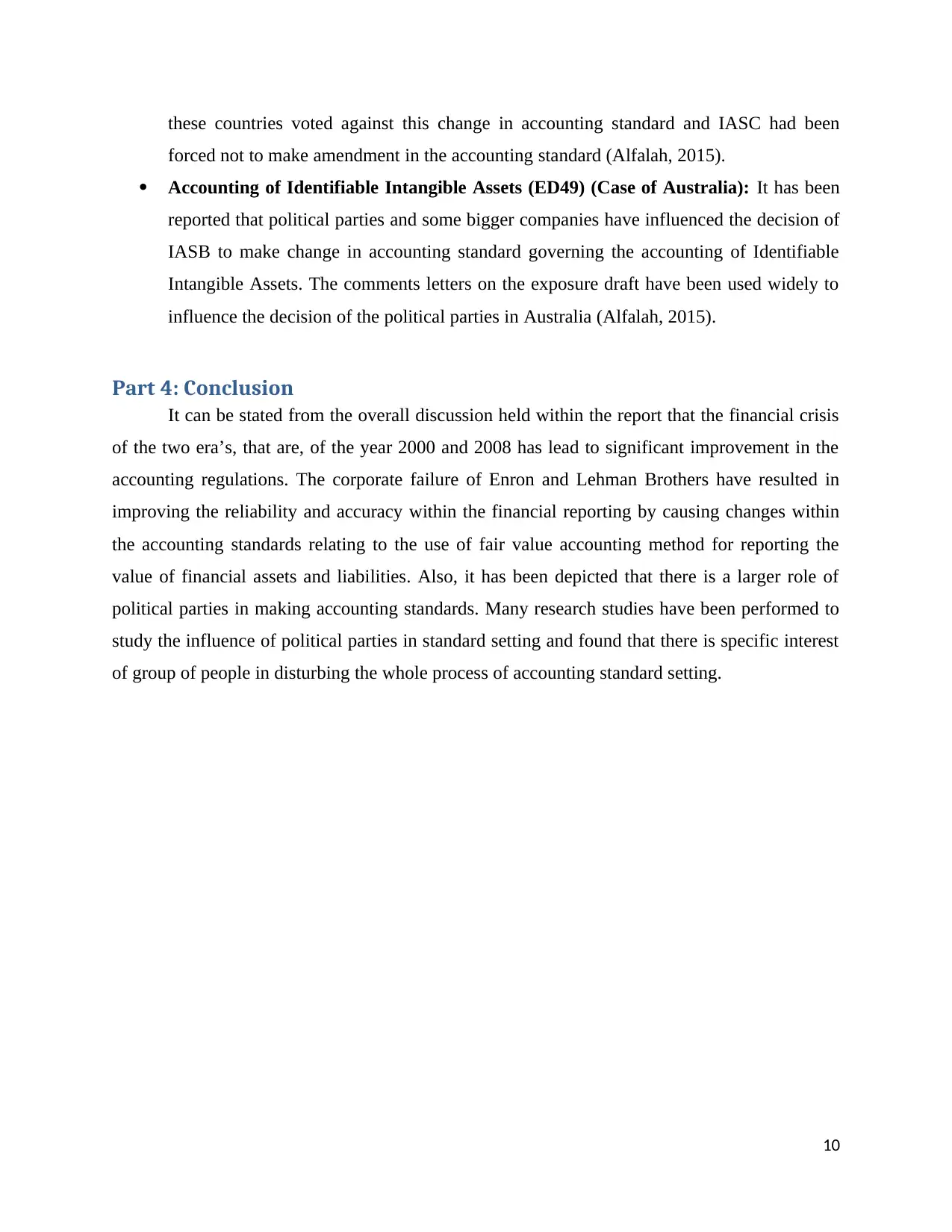
these countries voted against this change in accounting standard and IASC had been
forced not to make amendment in the accounting standard (Alfalah, 2015).
Accounting of Identifiable Intangible Assets (ED49) (Case of Australia): It has been
reported that political parties and some bigger companies have influenced the decision of
IASB to make change in accounting standard governing the accounting of Identifiable
Intangible Assets. The comments letters on the exposure draft have been used widely to
influence the decision of the political parties in Australia (Alfalah, 2015).
Part 4: Conclusion
It can be stated from the overall discussion held within the report that the financial crisis
of the two era’s, that are, of the year 2000 and 2008 has lead to significant improvement in the
accounting regulations. The corporate failure of Enron and Lehman Brothers have resulted in
improving the reliability and accuracy within the financial reporting by causing changes within
the accounting standards relating to the use of fair value accounting method for reporting the
value of financial assets and liabilities. Also, it has been depicted that there is a larger role of
political parties in making accounting standards. Many research studies have been performed to
study the influence of political parties in standard setting and found that there is specific interest
of group of people in disturbing the whole process of accounting standard setting.
10
forced not to make amendment in the accounting standard (Alfalah, 2015).
Accounting of Identifiable Intangible Assets (ED49) (Case of Australia): It has been
reported that political parties and some bigger companies have influenced the decision of
IASB to make change in accounting standard governing the accounting of Identifiable
Intangible Assets. The comments letters on the exposure draft have been used widely to
influence the decision of the political parties in Australia (Alfalah, 2015).
Part 4: Conclusion
It can be stated from the overall discussion held within the report that the financial crisis
of the two era’s, that are, of the year 2000 and 2008 has lead to significant improvement in the
accounting regulations. The corporate failure of Enron and Lehman Brothers have resulted in
improving the reliability and accuracy within the financial reporting by causing changes within
the accounting standards relating to the use of fair value accounting method for reporting the
value of financial assets and liabilities. Also, it has been depicted that there is a larger role of
political parties in making accounting standards. Many research studies have been performed to
study the influence of political parties in standard setting and found that there is specific interest
of group of people in disturbing the whole process of accounting standard setting.
10
Paraphrase This Document
Need a fresh take? Get an instant paraphrase of this document with our AI Paraphraser
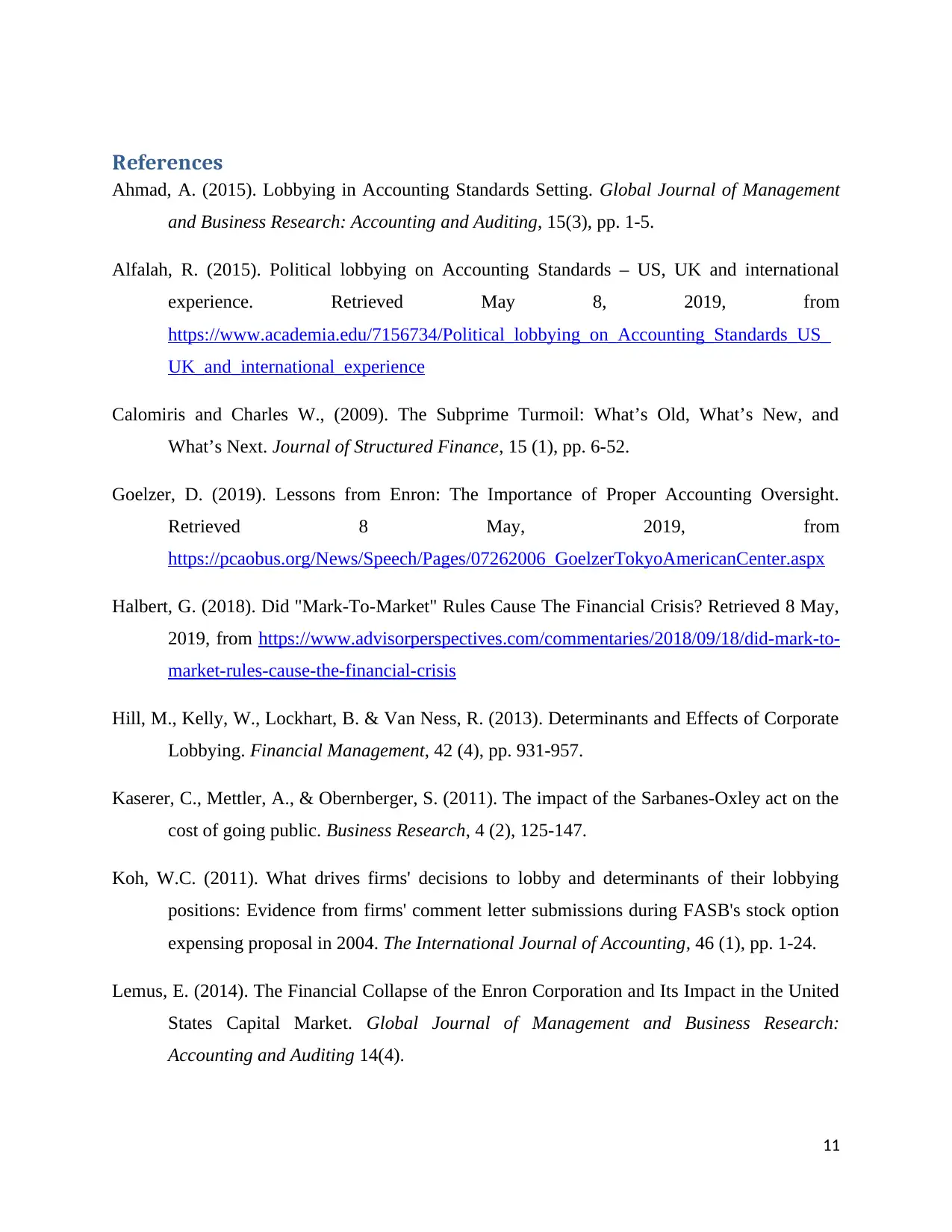
References
Ahmad, A. (2015). Lobbying in Accounting Standards Setting. Global Journal of Management
and Business Research: Accounting and Auditing, 15(3), pp. 1-5.
Alfalah, R. (2015). Political lobbying on Accounting Standards – US, UK and international
experience. Retrieved May 8, 2019, from
https://www.academia.edu/7156734/Political_lobbying_on_Accounting_Standards_US_
UK_and_international_experience
Calomiris and Charles W., (2009). The Subprime Turmoil: What’s Old, What’s New, and
What’s Next. Journal of Structured Finance, 15 (1), pp. 6-52.
Goelzer, D. (2019). Lessons from Enron: The Importance of Proper Accounting Oversight.
Retrieved 8 May, 2019, from
https://pcaobus.org/News/Speech/Pages/07262006_GoelzerTokyoAmericanCenter.aspx
Halbert, G. (2018). Did "Mark-To-Market" Rules Cause The Financial Crisis? Retrieved 8 May,
2019, from https://www.advisorperspectives.com/commentaries/2018/09/18/did-mark-to-
market-rules-cause-the-financial-crisis
Hill, M., Kelly, W., Lockhart, B. & Van Ness, R. (2013). Determinants and Effects of Corporate
Lobbying. Financial Management, 42 (4), pp. 931-957.
Kaserer, C., Mettler, A., & Obernberger, S. (2011). The impact of the Sarbanes-Oxley act on the
cost of going public. Business Research, 4 (2), 125-147.
Koh, W.C. (2011). What drives firms' decisions to lobby and determinants of their lobbying
positions: Evidence from firms' comment letter submissions during FASB's stock option
expensing proposal in 2004. The International Journal of Accounting, 46 (1), pp. 1-24.
Lemus, E. (2014). The Financial Collapse of the Enron Corporation and Its Impact in the United
States Capital Market. Global Journal of Management and Business Research:
Accounting and Auditing 14(4).
11
Ahmad, A. (2015). Lobbying in Accounting Standards Setting. Global Journal of Management
and Business Research: Accounting and Auditing, 15(3), pp. 1-5.
Alfalah, R. (2015). Political lobbying on Accounting Standards – US, UK and international
experience. Retrieved May 8, 2019, from
https://www.academia.edu/7156734/Political_lobbying_on_Accounting_Standards_US_
UK_and_international_experience
Calomiris and Charles W., (2009). The Subprime Turmoil: What’s Old, What’s New, and
What’s Next. Journal of Structured Finance, 15 (1), pp. 6-52.
Goelzer, D. (2019). Lessons from Enron: The Importance of Proper Accounting Oversight.
Retrieved 8 May, 2019, from
https://pcaobus.org/News/Speech/Pages/07262006_GoelzerTokyoAmericanCenter.aspx
Halbert, G. (2018). Did "Mark-To-Market" Rules Cause The Financial Crisis? Retrieved 8 May,
2019, from https://www.advisorperspectives.com/commentaries/2018/09/18/did-mark-to-
market-rules-cause-the-financial-crisis
Hill, M., Kelly, W., Lockhart, B. & Van Ness, R. (2013). Determinants and Effects of Corporate
Lobbying. Financial Management, 42 (4), pp. 931-957.
Kaserer, C., Mettler, A., & Obernberger, S. (2011). The impact of the Sarbanes-Oxley act on the
cost of going public. Business Research, 4 (2), 125-147.
Koh, W.C. (2011). What drives firms' decisions to lobby and determinants of their lobbying
positions: Evidence from firms' comment letter submissions during FASB's stock option
expensing proposal in 2004. The International Journal of Accounting, 46 (1), pp. 1-24.
Lemus, E. (2014). The Financial Collapse of the Enron Corporation and Its Impact in the United
States Capital Market. Global Journal of Management and Business Research:
Accounting and Auditing 14(4).
11
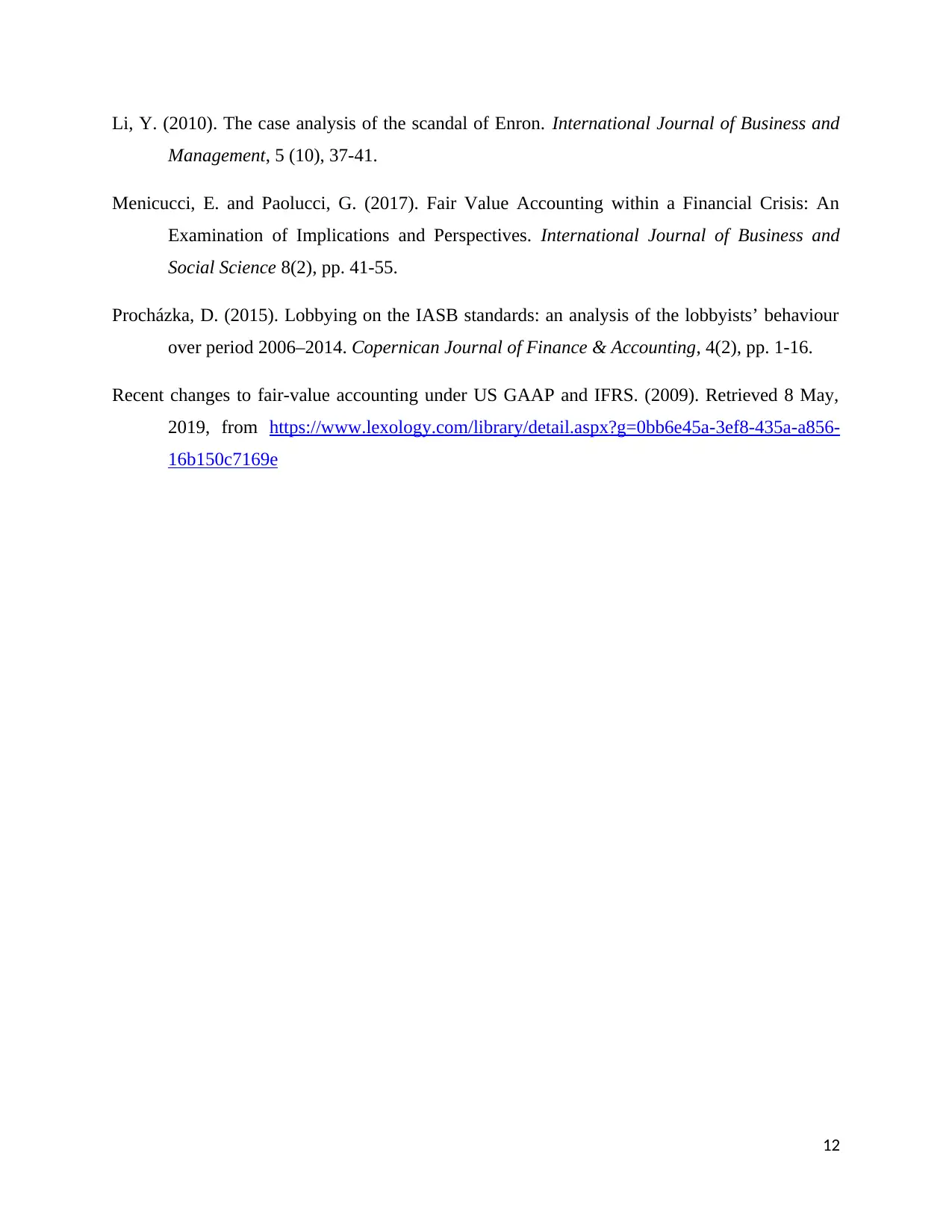
Li, Y. (2010). The case analysis of the scandal of Enron. International Journal of Business and
Management, 5 (10), 37-41.
Menicucci, E. and Paolucci, G. (2017). Fair Value Accounting within a Financial Crisis: An
Examination of Implications and Perspectives. International Journal of Business and
Social Science 8(2), pp. 41-55.
Procházka, D. (2015). Lobbying on the IASB standards: an analysis of the lobbyists’ behaviour
over period 2006–2014. Copernican Journal of Finance & Accounting, 4(2), pp. 1-16.
Recent changes to fair-value accounting under US GAAP and IFRS. (2009). Retrieved 8 May,
2019, from https://www.lexology.com/library/detail.aspx?g=0bb6e45a-3ef8-435a-a856-
16b150c7169e
12
Management, 5 (10), 37-41.
Menicucci, E. and Paolucci, G. (2017). Fair Value Accounting within a Financial Crisis: An
Examination of Implications and Perspectives. International Journal of Business and
Social Science 8(2), pp. 41-55.
Procházka, D. (2015). Lobbying on the IASB standards: an analysis of the lobbyists’ behaviour
over period 2006–2014. Copernican Journal of Finance & Accounting, 4(2), pp. 1-16.
Recent changes to fair-value accounting under US GAAP and IFRS. (2009). Retrieved 8 May,
2019, from https://www.lexology.com/library/detail.aspx?g=0bb6e45a-3ef8-435a-a856-
16b150c7169e
12
⊘ This is a preview!⊘
Do you want full access?
Subscribe today to unlock all pages.

Trusted by 1+ million students worldwide
1 out of 12
Related Documents
Your All-in-One AI-Powered Toolkit for Academic Success.
+13062052269
info@desklib.com
Available 24*7 on WhatsApp / Email
![[object Object]](/_next/static/media/star-bottom.7253800d.svg)
Unlock your academic potential
Copyright © 2020–2026 A2Z Services. All Rights Reserved. Developed and managed by ZUCOL.




